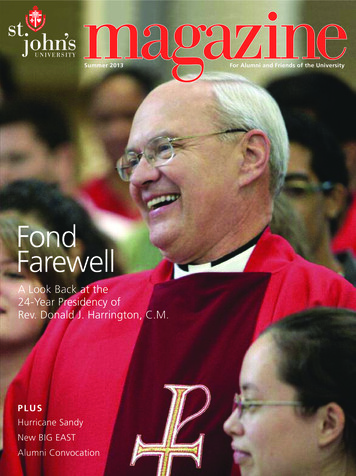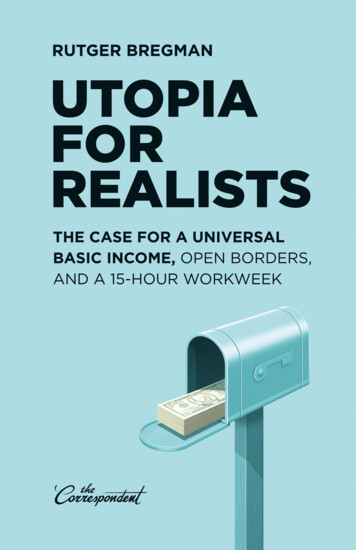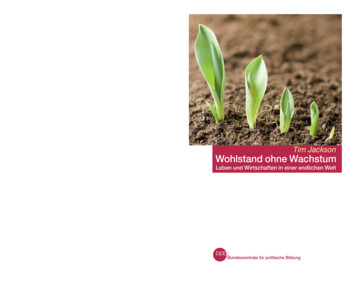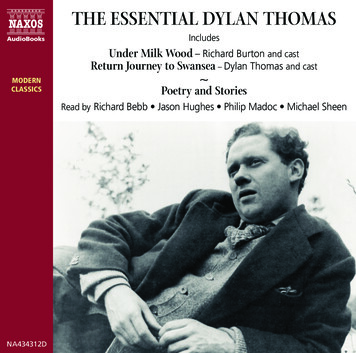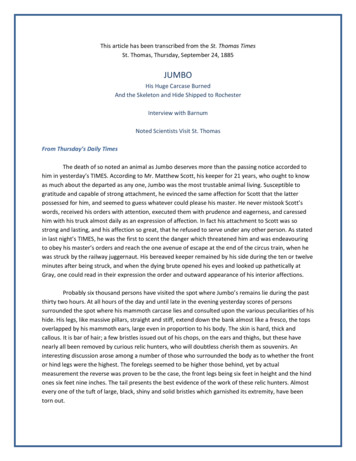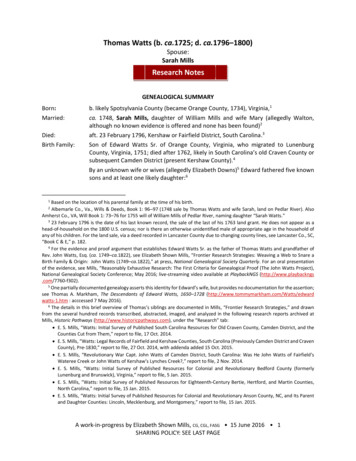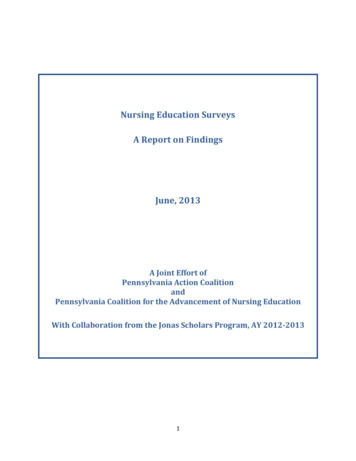
Transcription
Utopia by Thomas MoreUtopia by Thomas MoreThis etext was prepared by David Price, email ccx074@coventry.ac.ukfrom the 1901 Cassell & Co. edition.UTOPIAby Thomas MoreINTRODUCTIONSir Thomas More, son of Sir John More, a justice of the King'sBench, was born in 1478, in Milk Street, in the city of London.After his earlier education at St. Anthony's School, inThreadneedle Street, he was placed, as a boy, in the household ofCardinal John Morton, Archbishop of Canterbury and Lord Chancellor.It was not unusual for persons of wealth or influence and sons ofgood families to be so established together in a relation of patronand client. The youth wore his patron's livery, and added to hisstate. The patron used, afterwards, his wealth or influence inpage 1 / 140
helping his young client forward in the world. Cardinal Morton hadbeen in earlier days that Bishop of Ely whom Richard III. sent tothe Tower; was busy afterwards in hostility to Richard; and was achief adviser of Henry VII., who in 1486 made him Archbishop ofCanterbury, and nine months afterwards Lord Chancellor. CardinalMorton--of talk at whose table there are recollections in "Utopia"-delighted in the quick wit of young Thomas More. He once said,"Whoever shall live to try it, shall see this child here waiting attable prove a notable and rare man."At the age of about nineteen, Thomas More was sent to CanterburyCollege, Oxford, by his patron, where he learnt Greek of the firstmen who brought Greek studies from Italy to England--William Grocynand Thomas Linacre. Linacre, a physician, who afterwards tookorders, was also the founder of the College of Physicians. In1499, More left Oxford to study law in London, at Lincoln's Inn,and in the next year Archbishop Morton died.More's earnest character caused him while studying law to aim atthe subduing of the flesh, by wearing a hair shirt, taking a logfor a pillow, and whipping himself on Fridays. At the age oftwenty-one he entered Parliament, and soon after he had been calledto the bar he was made Under-Sheriff of London. In 1503 he opposedin the House of Commons Henry VII.'s proposal for a subsidy onaccount of the marriage portion of his daughter Margaret; and heopposed with so much energy that the House refused to grant it.One went and told the king that a beardless boy had disappointedpage 2 / 140
all his expectations. During the last years, therefore, of HenryVII. More was under the displeasure of the king, and had thoughtsof leaving the country.Henry VII. died in April, 1509, when More's age was a little overthirty. In the first years of the reign of Henry VIII. he rose tolarge practice in the law courts, where it is said he refused toplead in cases which he thought unjust, and took no fees fromwidows, orphans, or the poor. He would have preferred marrying thesecond daughter of John Colt, of New Hall, in Essex, but chose herelder sister, that he might not subject her to the discredit ofbeing passed over.In 1513 Thomas More, still Under-Sheriff of London, is said to havewritten his "History of the Life and Death of King Edward V., andof the Usurpation of Richard III." The book, which seems tocontain the knowledge and opinions of More's patron, Morton, wasnot printed until 1557, when its writer had been twenty-two yearsdead. It was then printed from a MS. in More's handwriting.In the year 1515 Wolsey, Archbishop of York, was made Cardinal byLeo X.; Henry VIII. made him Lord Chancellor, and from that yearuntil 1523 the King and the Cardinal ruled England with absoluteauthority, and called no parliament. In May of the year 1515Thomas More--not knighted yet--was joined in a commission to theLow Countries with Cuthbert Tunstal and others to confer with thepage 3 / 140
ambassadors of Charles V., then only Archduke of Austria, upon arenewal of alliance. On that embassy More, aged about thirtyseven, was absent from England for six months, and while at Antwerphe established friendship with Peter Giles (Latinised AEgidius), ascholarly and courteous young man, who was secretary to themunicipality of Antwerp.Cuthbert Tunstal was a rising churchman, chancellor to theArchbishop of Canterbury, who in that year (1515) was madeArchdeacon of Chester, and in May of the next year (1516) Master ofthe Rolls. In 1516 he was sent again to the Low Countries, andMore then went with him to Brussels, where they were in closecompanionship with Erasmus.More's "Utopia" was written in Latin, and is in two parts, of whichthe second, describing the place ([Greek text]--or Nusquama, as hecalled it sometimes in his letters--"Nowhere"), was probablywritten towards the close of 1515; the first part, introductory,early in 1516. The book was first printed at Louvain, late in1516, under the editorship of Erasmus, Peter Giles, and other ofMore's friends in Flanders. It was then revised by More, andprinted by Frobenius at Basle in November, 1518. It was reprintedat Paris and Vienna, but was not printed in England during More'slifetime. Its first publication in this country was in the Englishtranslation, made in Edward's VI.'s reign (1551) by Ralph Robinson.It was translated with more literary skill by Gilbert Burnet, in1684, soon after he had conducted the defence of his friend Lordpage 4 / 140
William Russell, attended his execution, vindicated his memory, andbeen spitefully deprived by James II. of his lectureship at St.Clement's. Burnet was drawn to the translation of "Utopia" by thesame sense of unreason in high places that caused More to write thebook. Burnet's is the translation given in this volume.The name of the book has given an adjective to our language--wecall an impracticable scheme Utopian. Yet, under the veil of aplayful fiction, the talk is intensely earnest, and abounds inpractical suggestion. It is the work of a scholarly and wittyEnglishman, who attacks in his own way the chief political andsocial evils of his time. Beginning with fact, More tells how hewas sent into Flanders with Cuthbert Tunstal, "whom the king'smajesty of late, to the great rejoicing of all men, did prefer tothe office of Master of the Rolls;" how the commissioners ofCharles met them at Bruges, and presently returned to Brussels forinstructions; and how More then went to Antwerp, where he found apleasure in the society of Peter Giles which soothed his desire tosee again his wife and children, from whom he had been four monthsaway. Then fact slides into fiction with the finding of RaphaelHythloday (whose name, made of two Greek words [Greek text] and[Greek text], means "knowing in trifles"), a man who had been withAmerigo Vespucci in the three last of the voyages to the new worldlately discovered, of which the account had been first printed in1507, only nine years before Utopia was written.Designedly fantastic in suggestion of details, "Utopia" is the workpage 5 / 140
of a scholar who had read Plato's "Republic," and had his fancyquickened after reading Plutarch's account of Spartan life underLycurgus. Beneath the veil of an ideal communism, into which therehas been worked some witty extravagance, there lies a noble Englishargument. Sometimes More puts the case as of France when he meansEngland. Sometimes there is ironical praise of the good faith ofChristian kings, saving the book from censure as a political attackon the policy of Henry VIII. Erasmus wrote to a friend in 1517that he should send for More's "Utopia," if he had not read it, and"wished to see the true source of all political evils." And toMore Erasmus wrote of his book, "A burgomaster of Antwerp is sopleased with it that he knows it all by heart."H. M.DISCOURSES OF RAPHAEL HYTHLODAY,OF THE BEST STATE OF A COMMONWEALTHHenry VIII., the unconquered King of England, a prince adorned withall the virtues that become a great monarch, having somedifferences of no small consequence with Charles the most serenePrince of Castile, sent me into Flanders, as his ambassador, fortreating and composing matters between them. I was colleague andcompanion to that incomparable man Cuthbert Tonstal, whom the King,with such universal applause, lately made Master of the Rolls; butof whom I will say nothing; not because I fear that the testimonypage 6 / 140
of a friend will be suspected, but rather because his learning andvirtues are too great for me to do them justice, and so well known,that they need not my commendations, unless I would, according tothe proverb, "Show the sun with a lantern." Those that wereappointed by the Prince to treat with us, met us at Bruges,according to agreement; they were all worthy men. The Margrave ofBruges was their head, and the chief man among them; but he thatwas esteemed the wisest, and that spoke for the rest, was GeorgeTemse, the Provost of Casselsee: both art and nature had concurredto make him eloquent: he was very learned in the law; and, as hehad a great capacity, so, by a long practice in affairs, he wasvery dexterous at unravelling them. After we had several timesmet, without coming to an agreement, they went to Brussels for somedays, to know the Prince's pleasure; and, since our business wouldadmit it, I went to Antwerp. While I was there, among many thatvisited me, there was one that was more acceptable to me than anyother, Peter Giles, born at Antwerp, who is a man of great honour,and of a good rank in his town, though less than he deserves; for Ido not know if there be anywhere to be found a more learned and abetter bred young man; for as he is both a very worthy and a veryknowing person, so he is so civil to all men, so particularly kindto his friends, and so full of candour and affection, that there isnot, perhaps, above one or two anywhere to be found, that is in allrespects so perfect a friend: he is extraordinarily modest, thereis no artifice in him, and yet no man has more of a prudentsimplicity. His conversation was so pleasant and so innocentlycheerful, that his company in a great measure lessened any longingsto go back to my country, and to my wife and children, which anpage 7 / 140
absence of four months had quickened very much. One day, as I wasreturning home from mass at St. Mary's, which is the chief church,and the most frequented of any in Antwerp, I saw him, by accident,talking with a stranger, who seemed past the flower of his age; hisface was tanned, he had a long beard, and his cloak was hangingcarelessly about him, so that, by his looks and habit, I concludedhe was a seaman. As soon as Peter saw me, he came and saluted me,and as I was returning his civility, he took me aside, and pointingto him with whom he had been discoursing, he said, "Do you see thatman? I was just thinking to bring him to you." I answered, "Heshould have been very welcome on your account." "And on his owntoo," replied he, "if you knew the man, for there is none alivethat can give so copious an account of unknown nations andcountries as he can do, which I know you very much desire.""Then," said I, "I did not guess amiss, for at first sight I tookhim for a seaman." "But you are much mistaken," said he, "for hehas not sailed as a seaman, but as a traveller, or rather aphilosopher. This Raphael, who from his family carries the name ofHythloday, is not ignorant of the Latin tongue, but is eminentlylearned in the Greek, having applied himself more particularly tothat than to the former, because he had given himself much tophilosophy, in which he knew that the Romans have left us nothingthat is valuable, except what is to be found in Seneca and Cicero.He is a Portuguese by birth, and was so desirous of seeing theworld, that he divided his estate among his brothers, ran the samehazard as Americus Vesputius, and bore a share in three of his fourvoyages that are now published; only he did not return with him inhis last, but obtained leave of him, almost by force, that he mightpage 8 / 140
be one of those twenty-four who were left at the farthest place atwhich they touched in their last voyage to New Castile. Theleaving him thus did not a little gratify one that was more fond oftravelling than of returning home to be buried in his own country;for he used often to say, that the way to heaven was the same fromall places, and he that had no grave had the heavens still overhim. Yet this disposition of mind had cost him dear, if God hadnot been very gracious to him; for after he, with five Castalians,had travelled over many countries, at last, by strange goodfortune, he got to Ceylon, and from thence to Calicut, where he,very happily, found some Portuguese ships; and, beyond all men'sexpectations, returned to his native country." When Peter had saidthis to me, I thanked him for his kindness in intending to give methe acquaintance of a man whose conversation he knew would be soacceptable; and upon that Raphael and I embraced each other. Afterthose civilities were past which are usual with strangers upontheir first meeting, we all went to my house, and entering into thegarden, sat down on a green bank and entertained one another indiscourse. He told us that when Vesputius had sailed away, he, andhis companions that stayed behind in New Castile, by degreesinsinuated themselves into the affections of the people of thecountry, meeting often with them and treating them gently; and atlast they not only lived among them without danger, but conversedfamiliarly with them, and got so far into the heart of a prince,whose name and country I have forgot, that he both furnished themplentifully with all things necessary, and also with theconveniences of travelling, both boats when they went by water, andwaggons when they trained over land: he sent with them a verypage 9 / 140
faithful guide, who was to introduce and recommend them to suchother princes as they had a mind to see: and after many days'journey, they came to towns, and cities, and to commonwealths, thatwere both happily governed and well peopled. Under the equator,and as far on both sides of it as the sun moves, there lay vastdeserts that were parched with the perpetual heat of the sun; thesoil was withered, all things looked dismally, and all places wereeither quite uninhabited, or abounded with wild beasts andserpents, and some few men, that were neither less wild nor lesscruel than the beasts themselves. But, as they went farther, a newscene opened, all things grew milder, the air less burning, thesoil more verdant, and even the beasts were less wild: and, atlast, there were nations, towns, and cities, that had not onlymutual commerce among themselves and with their neighbours, buttraded, both by sea and land, to very remote countries. There theyfound the conveniencies of seeing many countries on all hands, forno ship went any voyage into which he and his companions were notvery welcome. The first vessels that they saw were flat-bottomed,their sails were made of reeds and wicker, woven close together,only some were of leather; but, afterwards, they found ships madewith round keels and canvas sails, and in all respects like ourships, and the seamen understood both astronomy and navigation. Hegot wonderfully into their favour by showing them the use of theneedle, of which till then they were utterly ignorant. They sailedbefore with great caution, and only in summer time; but now theycount all seasons alike, trusting wholly to the loadstone, in whichthey are, perhaps, more secure than safe; so that there is reasonto fear that this discovery, which was thought would prove so muchpage 10 / 140
to their advantage, may, by their imprudence, become an occasion ofmuch mischief to them. But it were too long to dwell on all thathe told us he had observed in every place, it would be too great adigression from our present purpose: whatever is necessary to betold concerning those wise and prudent institutions which heobserved among civilised nations, may perhaps be related by us on amore proper occasion. We asked him many questions concerning allthese things, to which he answered very willingly; we made noinquiries after monsters, than which nothing is more common; foreverywhere one may hear of ravenous dogs and wolves, and cruel meneaters, but it is not so easy to find states that are well andwisely governed.As he told us of many things that were amiss in those newdiscovered countries, so he reckoned up not a few things, fromwhich patterns might be taken for correcting the errors of thesenations among whom we live; of which an account may be given, as Ihave already promised, at some other time; for, at present, Iintend only to relate those particulars that he told us, of themanners and laws of the Utopians: but I will begin with theoccasion that led us to speak of that commonwealth. After Raphaelhad discoursed with great judgment on the many errors that wereboth among us and these nations, had treated of the wiseinstitutions both here and there, and had spoken as distinctly ofthe customs and government of every nation through which he hadpast, as if he had spent his whole life in it, Peter, being struckwith admiration, said, "I wonder, Raphael, how it comes that youpage 11 / 140
enter into no king's service, for I am sure there are none to whomyou would not be very acceptable; for your learning and knowledge,both of men and things, is such, that you would not only entertainthem very pleasantly, but be of great use to them, by the examplesyou could set before them, and the advices you could give them; andby this means you would both serve your own interest, and be ofgreat use to all your friends." "As for my friends," answered he,"I need not be much concerned, having already done for them allthat was incumbent on me; for when I was not only in good health,but fresh and young, I distributed that among my kindred andfriends which other people do not part with till they are old andsick: when they then unwillingly give that which they can enjoy nolonger themselves. I think my friends ought to rest contented withthis, and not to expect that for their sakes I should enslavemyself to any king whatsoever." "Soft and fair!" said Peter; "I donot mean that you should be a slave to any king, but only that youshould assist them and be useful to them." "The change of theword," said he, "does not alter the matter." "But term it as youwill," replied Peter, "I do not see any other way in which you canbe so useful, both in private to your friends and to the public,and by which you can make your own condition happier." "Happier?"answered Raphael, "is that to be compassed in a way so abhorrent tomy genius? Now I live as I will, to which I believe, few courtierscan pretend; and there are so many that court the favour of greatmen, that there will be no great loss if they are not troubledeither with me or with others of my temper." Upon this, said I, "Iperceive, Raphael, that you neither desire wealth nor greatness;and, indeed, I value and admire such a man much more than I do anypage 12 / 140
of the great men in the world. Yet I think you would do what wouldwell become so generous and philosophical a soul as yours is, ifyou would apply your time and thoughts to public affairs, eventhough you may happen to find it a little uneasy to yourself; andthis you can never do with so much advantage as by being taken intothe council of some great prince and putting him on noble andworthy actions, which I know you would do if you were in such apost; for the springs both of good and evil flow from the princeover a whole nation, as from a lasting fountain. So much learningas you have, even without practice in affairs, or so great apractice as you have had, without any other learning, would renderyou a very fit counsellor to any king whatsoever." "You are doublymistaken," said he, "Mr. More, both in your opinion of me and inthe judgment you make of things: for as I have not that capacitythat you fancy I have, so if I had it, the public would not be onejot the better when I had sacrificed my quiet to it. For mostprinces apply themselves more to affairs of war than to the usefularts of peace; and in these I neither have any knowledge, nor do Imuch desire it; they are generally more set on acquiring newkingdoms, right or wrong, than on governing well those theypossess: and, among the ministers of princes, there are none thatare not so wise as to need no assistance, or at least, that do notthink themselves so wise that they imagine they need none; and ifthey court any, it is only those for whom the prince has muchpersonal favour, whom by their fawning and flatteries theyendeavour to fix to their own interests; and, indeed, nature has somade us, that we all love to be flattered and to please ourselveswith our own notions: the old crow loves his young, and the apepage 13 / 140
her cubs. Now if in such a court, made up of persons who envy allothers and only admire themselves, a person should but proposeanything that he had either read in history or observed in histravels, the rest would think that the reputation of their wisdomwould sink, and that their interests would be much depressed ifthey could not run it down: and, if all other things failed, thenthey would fly to this, that such or such things pleased ourancestors, and it were well for us if we could but match them.They would set up their rest on such an answer, as a sufficientconfutation of all that could be said, as if it were a greatmisfortune that any should be found wiser than his ancestors. Butthough they willingly let go all the good things that were amongthose of former ages, yet, if better things are proposed, theycover themselves obstinately with this excuse of reverence to pasttimes. I have met with these proud, morose, and absurd judgmentsof things in many places, particularly once in England." "Were youever there?" said I. "Yes, I was," answered he, "and stayed somemonths there, not long after the rebellion in the West wassuppressed, with a great slaughter of the poor people that wereengaged in it."I was then much obliged to that reverend prelate, John Morton,Archbishop of Canterbury, Cardinal, and Chancellor of England; aman," said he, "Peter (for Mr. More knows well what he was), thatwas not less venerable for his wisdom and virtues than for the highcharacter he bore: he was of a middle stature, not broken withage; his looks begot reverence rather than fear; his conversationpage 14 / 140
was easy, but serious and grave; he sometimes took pleasure to trythe force of those that came as suitors to him upon business byspeaking sharply, though decently, to them, and by that hediscovered their spirit and presence of mind; with which he wasmuch delighted when it did not grow up to impudence, as bearing agreat resemblance to his own temper, and he looked on such personsas the fittest men for affairs. He spoke both gracefully andweightily; he was eminently skilled in the law, had a vastunderstanding, and a prodigious memory; and those excellent talentswith which nature had furnished him were improved by study andexperience. When I was in England the King depended much on hiscounsels, and the Government seemed to be chiefly supported by him;for from his youth he had been all along practised in affairs; and,having passed through many traverses of fortune, he had, with greatcost, acquired a vast stock of wisdom, which is not soon lost whenit is purchased so dear. One day, when I was dining with him,there happened to be at table one of the English lawyers, who tookoccasion to run out in a high commendation of the severe executionof justice upon thieves, 'who,' as he said, 'were then hanged sofast that there were sometimes twenty on one gibbet!' and, uponthat, he said, 'he could not wonder enough how it came to passthat, since so few escaped, there were yet so many thieves left,who were still robbing in all places.' Upon this, I (who took theboldness to speak freely before the Cardinal) said, 'There was noreason to wonder at the matter, since this way of punishing thieveswas neither just in itself nor good for the public; for, as theseverity was too great, so the remedy was not effectual; simpletheft not being so great a crime that it ought to cost a man hispage 15 / 140
life; no punishment, how severe soever, being able to restrainthose from robbing who can find out no other way of livelihood. Inthis,' said I, 'not only you in England, but a great part of theworld, imitate some ill masters, that are readier to chastise theirscholars than to teach them. There are dreadful punishmentsenacted against thieves, but it were much better to make such goodprovisions by which every man might be put in a method how to live,and so be preserved from the fatal necessity of stealing and ofdying for it.' 'There has been care enough taken for that,' saidhe; 'there are many handicrafts, and there is husbandry, by whichthey may make a shift to live, unless they have a greater mind tofollow ill courses.' 'That will not serve your turn,' said I, 'formany lose their limbs in civil or foreign wars, as lately in theCornish rebellion, and some time ago in your wars with France, who,being thus mutilated in the service of their king and country, canno more follow their old trades, and are too old to learn new ones;but since wars are only accidental things, and have intervals, letus consider those things that fall out every day. There is a greatnumber of noblemen among you that are themselves as idle as drones,that subsist on other men's labour, on the labour of their tenants,whom, to raise their revenues, they pare to the quick. This,indeed, is the only instance of their frugality, for in all otherthings they are prodigal, even to the beggaring of themselves; but,besides this, they carry about with them a great number of idlefellows, who never learned any art by which they may gain theirliving; and these, as soon as either their lord dies, or theythemselves fall sick, are turned out of doors; for your lords arereadier to feed idle people than to take care of the sick; andpage 16 / 140
often the heir is not able to keep together so great a family ashis predecessor did. Now, when the stomachs of those that are thusturned out of doors grow keen, they rob no less keenly; and whatelse can they do? For when, by wandering about, they have worn outboth their health and their clothes, and are tattered, and lookghastly, men of quality will not entertain them, and poor men darenot do it, knowing that one who has been bred up in idleness andpleasure, and who was used to walk about with his sword andbuckler, despising all the neighbourhood with an insolent scorn asfar below him, is not fit for the spade and mattock; nor will heserve a poor man for so small a hire and in so low a diet as he canafford to give him.' To this he answered, 'This sort of men oughtto be particularly cherished, for in them consists the force of thearmies for which we have occasion; since their birth inspires themwith a nobler sense of honour than is to be found among tradesmenor ploughmen.' 'You may as well say,' replied I, 'that you mustcherish thieves on the account of wars, for you will never want theone as long as you have the other; and as robbers prove sometimesgallant soldiers, so soldiers often prove brave robbers, so near analliance there is between those two sorts of life. But this badcustom, so common among you, of keeping many servants, is notpeculiar to this nation. In France there is yet a more pestiferoussort of people, for the whole country is full of soldiers, stillkept up in time of peace (if such a state of a nation can be calleda peace); and these are kept in pay upon the same account that youplead for those idle retainers about noblemen: this being a maximof those pretended statesmen, that it is necessary for the publicsafety to have a good body of veteran soldiers ever in readiness.page 17 / 140
They think raw men are not to be depended on, and they sometimesseek occasions for making war, that they may train up theirsoldiers in the art of cutting throats, or, as Sallust observed,"for keeping their hands in use, that they may not grow dull by toolong an intermission." But France has learned to its cost howdangerous it is to feed such beasts. The fate of the Romans,Carthaginians, and Syrians, and many other nations and cities,which were both overturned and quite ruined by those standingarmies, should make others wiser; and the folly of this maxim ofthe French appears plainly even from this, that their trainedsoldiers often find your raw men prove too hard for them, of whichI will not say much, lest you may think I flatter the English.Every day's experience shows that the mechanics in the towns or theclowns in the country are not afraid of fighting with those idlegentlemen, if they are not disabled by some misfortune in theirbody or dispirited by extreme want; so that you need not fear thatthose well-shaped and strong men (for it is only such that noblemenlove to keep about them till they spoil them), who now grow feeblewith ease and are softened with their effeminate manner of life,would be less fit for action if they were well bred and wellemployed. And it seems very unreasonable that, for the prospect ofa war, which you need never have but when you please, you shouldmaintain so many idle men, as will always disturb you in time ofpeace, which is ever to be more considered than war. But I do notthink that this necessity of stealing arises only from hence; thereis another cause of it, more peculiar to England.' 'What is that?'said the Cardinal: 'The increase of pasture,' said I, 'by whichyour sheep, which are naturally mild, and easily kept in order, maypage 18 / 140
be said now to devour men and unpeople, not only villages, buttowns; for wherever it is found that the sheep of any soil yield asofter and richer wool than ordinary, there the nobility andgentry, and even those holy men, the dobots! not contented with theold rents which their farms yielded, nor thinking it enough thatthey, living at their ease, do no good to the pu
to his friends, and so full of candour and affection, that there is not, perhaps, above one or two anywhere to be found, that is in all respects so perfect a friend: he is extraordinarily modest, there is no artifice in him, and yet no man has more of a prudent simpl
